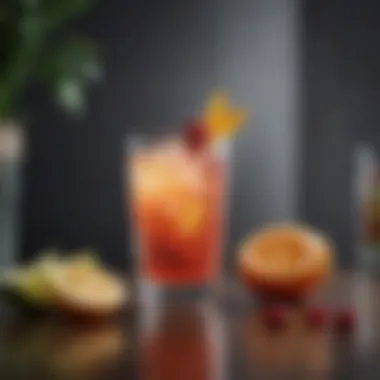Reflections on a Week of Sobriety and Self-Discovery


Intro
Deciding to take a break from alcohol for a week might feel like stepping into uncharted waters. For many, the thought of navigating through seven days without their favourite drink can be daunting, even intimidating. But this challenge can also serve as an enlightening journey. The purpose of this experience is multifaceted—not only is it a chance to detoxify the body, but it’s also an opportunity to reassess one’s relationship with alcohol and the role it plays in everyday life.
Key Takeaways
The insights gathered from a week without alcohol can be profound. During this time, individuals often discover new aspects of their physical and mental health, and they may even illuminate what actually motivates their drinking habits. This exploration touches on:
- The physical impact of abstaining from alcohol: how it affects sleep, energy, and overall health.
- Mental clarity: the reduction of anxiety and the clarity that may emerge from sobriety.
- Nutritional choices: the shift towards healthier eating habits and their benefits.
- Social dynamics: how peer pressure and social interactions shift when drinking is off the table.
Ultimately, those taking this plunge can emerge from the experience with a deeper understanding of their own well-being, setting the stage for long-term positive changes. This isn’t just a week off—it’s a step toward a healthier, more mindful lifestyle.
Foreword
Navigating a week without alcohol might seem like a daunting task, yet it holds significant importance, especially in today’s fast-paced world. Many individuals find themselves caught in the cycle of daily drinking, whether as a way to unwind after work or to add a social spark to gatherings. But, taking a deliberate pause can open the door to reflections that are often overlooked.
The journey of abstaining from alcohol for just one week offers a unique lens through which to evaluate one’s habits. It encourages people to confront their relationship with alcohol head-on, potentially leading to insights about how it affects their physical and mental health. Beyond mere abstinence, this week can present opportunities to recenter your life and explore alternative avenues for relaxation and enjoyment.
This article will delve into the nitty-gritty of what it means to go sans alcohol for seven days. From the initial motivations and potential pitfalls to the revelations and physical changes experienced during this span, each section is aimed to provide perspectives that elude the casual drinker.
By the end of the week, individuals might not only discover the benefits of sobriety but also gain clarity on why they reached for that glass in the first place. This reflective journey is not merely a test of willpower; it aims to enrich one’s understanding of personal choices around alcohol and its impact on overall well-being.
The Context of Alcohol Consumption
Understanding the context surrounding alcohol consumption today is crucial. In many cultures, drinking is touted as a rite of passage, a celebratory act, or simply a social lubricant. Chemicals in alcohol trigger a complex cocktail of effects—lowering inhibitions, generating feelings of euphoria, and acting as a relaxant. However, for a significant number of individuals, this relationship can morph into something more complex, often leading to reliance rather than enjoyment.
Moreover, the continuous presence of alcohol in social settings normalizes consumption, making it challenging to step back and examine one's habits. Many might find that they sip a drink simply because others do, not because they genuinely crave it. Understanding the background of alcohol as a staple in various contexts better equips one to recognize when it might be influencing their choices adversely.
Rationale for a Week-Long Break
Why take a week off from drinking? For many, it could be to refresh and revitalize their bodies, or to simply check if alcohol plays too large a role in daily routines. Here are a few reasons that resonate with those contemplating this decision:
- Health Benefits: Cutting out alcohol for a week can lead to noticeable physical benefits, from improved sleep quality to enhanced clarity and energy levels.
- Mental Clarity: A week without booze offers a mental reset. This period can help individuals gauge how much their cognitive functions are affected by regular alcohol intake.
- Social Experimentation: Choosing not to drink lets you explore how social dynamics shift. This exploration can reveal which connections are genuine and which are propped up by shared drinking habits.
- Financial Savings: Besides the health and social aspects, there’s often an unexpected financial advantage. Paying for booze can add up quickly—saving that cash during a week can be quite an eye-opener.
Taking these matters into account, a week off alcohol serves not just as a challenge but also as a substantial opportunity for reflection and growth.
Preparing for the Challenge
Tackling a week without alcohol is no small feat. The act of preparing for this challenge is crucial, as it lays the groundwork for what one might encounter during the week. This prohibition isn't merely about abstaining from drinks; it's a journey that can be both enlightening and, at times, difficult. Understanding how to effectively prepare enables individuals to approach their week without the allure of liquid courage that they normally rely on in social settings, after a hard day, or during celebrations. The better prepared one is, the more likely they are to reap the benefits of the experience.
Setting Clear Intentions
Setting intentions could be compared to planting a seed. Without the right conditions, that seed might struggle to thrive. When deciding to forgo alcohol for a week, it’s essential to clarify why this is being done. Is it to reset one’s health, respond to a specific event or simply to see how life feels without the influence of alcohol? Writing these intentions down can be immensely helpful.
For example, jotting down "I want to see if I feel more energetic" or "I wish to observe my mood changes throughout the week" sets a tangible target. Re-visiting these intentions daily can serve to reinforce commitment.


Recognizing Triggers and Temptations
It’s not just about abstaining; it’s about being aware of the situations where one might falter. Recognizing triggers can be likened to spotting a storm on the horizon. Some common triggers include social gatherings, stress, and even certain routines that involve drinking. Understanding these can help in creating strategies to face them.
For example:
- Social Events: If happy hour with colleagues is an anticipated challenge, prep an alternative drink like sparkling water or a non-alcoholic beer.
- Stressful Days: If it’s the end of a grueling day, consider a calming tea or a walk instead of reaching for a drink
- Routine Moments: Acknowledge when a cup of wine is usually enjoyed with dinner and alter that ritual by preparing a special mocktail.
By identifying these pitfalls in advance, the commitment to stay sober becomes a bit sturdier.
Creating a Supportive Environment
Often, one is only as strong as their surroundings. Surrounding oneself with a supportive environment is a transformative step in this journey. That means both the physical space and the people in your life. Remove cues that may spur a craving: perhaps it’s time to clear out the liquor cabinet or inform housemates that the week involves sobriety.
Support from family and friends can be the make-or-break aspect of this experience. Consider having a buddy system where one can share nightly reflections. Online forums can also act as a lifeline; places like Reddit provide communities to connect with others on similar paths.
Engaging in activities that do not involve alcohol can be beneficial – explore new hobbies, go for hikes, or take yoga classes. By immersing oneself in supportive environments, both physically and socially, the chance of staying committed to the challenge greatly increases.
"The only way to get through challenges is preparation, awareness, and support. Make this a week of exploration instead of deprivation."
By taking these preparatory steps seriously, one sets the stage not just for a week of sobriety, but for a deeper introspection into what life can be like without relying on alcohol.
Engaging fully in each of these preparation areas builds a robust foundation that promotes resilience in moments of potential weakness. It’s not just a week off from drinking; it’s an opportunity to explore and reflect.
Day-by-Day Breakdown
The section dealing with the daily breakdown of a week without alcohol serves as a vital framework for understanding the nuances and revelations that unfold during this time. Each day presents unique challenges as well as opportunities for growth and reflection. By approaching the task with a structured mindset, individuals can gain deeper insights into their behaviors and motivations regarding alcohol consumption. This incremental approach prepares the individual psychologically to confront and process the experiences each day brings. Additionally, keeping a record of daily thoughts can help articulate progress and examine the mental shifts that take place.
Day One: The Initial Shift
The first day marks a significant juncture when you make a conscious decision to step away from alcohol. It’s often a jarring experience as you feel a mixture of anticipation and apprehension. Suddenly, those rituals associated with drinking—like happy hour with friends or enjoying a glass of wine at dinner—begin to feel distant.
You might notice early signs of withdrawal as cravings can hit strong, especially in the first evening. Managing these moments can set the tone for the entire week. Finding substitutes, such as non-alcoholic beverages like sparkling water or herbal tea, can help soothe those urges and give a refreshing twist to your evening routine.
Day Two: Confronting Withdrawal Symptoms
As day two rolls around, many people find that their bodies are less cooperative than they anticipated. Withdrawal symptoms can manifest in various ways, including headache, irritability, and even slight anxiety. You might feel like you've been run over by a truck, which can be discouraging.
It's essential to acknowledge these physical reactions while steering clear of self-pity. Focus on hydration and nutrition. Fruit smoothies or a hearty soup can do wonders for recovery. Light exercises, like going for a gentle walk, might also help lift the fog. Understand that you are not alone in this journey; many people have been.
Day Three: Re-evaluating Relationships with Alcohol
By the third day, some may experience a form of clarity that allows for introspection regarding their relationship with alcohol. Questions may pop up: Why do I drink? What purpose does it serve? This can create a healthy tension; it feels like peeling back the layers of an onion.
This day can be ideal for journaling thoughts after you’ve spent time contemplating. It's an opportunity to recognize triggers and understand emotional motivations behind drinking. Some may feel liberated at the realization that they can have fun and socialize sober, which redefines what enjoyment means.
Day Four: Strategies for Coping


With day four comes the need for strategies to handle social situations and cravings. Building skills to manage impulses makes the whole experience worthwhile. Perhaps preparing a list of activities for when the urge strikes is helpful.
- Deep Breathing: Calm yourself with focused deep breathing, which helps center your thoughts.
- Engage in Hobbies: Rediscover hobbies or pick up new ones that do not involve alcohol.
- Social Connections: Reach out to a friend who understands your goals; sharing your experiences can make a world of difference.
Having a solid plan can bolster your resolve.
Day Five: Noticing Physical Changes
The fifth day often brings about noticeable changes that may surprise you. Many participants report feeling lighter, both in body and spirit. Sleep can improve, leading to more energy and a clearer mind. Perhaps your skin appears fresher, and you might notice that your sense of taste and smell is heightened.
Documenting these physical changes accentuates your efforts. You may still miss drinking to a degree, but feeling good about yourself can shift the narrative to gratitude for your body’s resilience.
Day Six: Emotional Reflections
As day six arrives, emotions can become intense. Feelings buried under layers of booze might rise to the surface. It can feel overwhelming, yet facing them is crucial for growth. You'll likely flip between euphoric highs and deeper lows. Allowing them to pass rather than pushing them away will provide lasting relief.
Consider each feeling as an opportunity for self-exploration. Reflect on how long you've suppressed certain thoughts. Therapy, support groups, or online forums like reddit.com can offer shared experiences to ease feelings of isolation.
Day Seven: Preparing to Reflect
As this week closes, day seven is all about reflection. It’s time to look back and consider how you've grown. Reviewing daily notes can provide valuable context; there’s a chance you've changed more than expected. How does it feel to have completed a week? What insights have emerged that you’d like to keep?
Preparing for the future becomes a thoughtful process. You might plan what moderation looks like for you moving forward or how to maintain sobriety in social settings. It’s the perfect moment to set goals, reinforcing the progress made and looking ahead to potential long-term benefits.
"Change is never easy, but acknowledging the journey can be rewarding beyond measure."
Post-Week Reflections
Taking a step back after a week without alcohol offers a valuable chance to reflect on the journey undertaken. These reflections can shed light on personal insights, changes in behavior, and broader implications of one’s relationship with alcohol. It’s not merely an analysis of the week gone by but a way to digest the various dimensions of sobriety that emerged during that time. In essence, post-week reflections help illuminate the path ahead.
Evaluating the Experience
When it comes to evaluating the experience, take a moment to jot down what stood out during the week. This could include questions like: What was the most challenging part? Were there moments of clarity? Alternatively, was there a surprising sense of relief? Keeping a journal of these thoughts can serve as a valuable tool, both for understanding past behaviors and shaping future choices.
After a week of sober moments, you might feel a wide array of emotions - from pride to surprise about how you managed cravings or social situations. Reflecting on these experiences is crucial. It lays the groundwork for appreciating the steps taken while also identifying areas for further growth. Ask yourself if your initial intentions matched your experiences or if any unforeseen factors played a role.
Impact on Mental Health and Clarity
The mental health benefits of a week without alcohol can be profound. Many find that the fog of daily drinking clears, leading to improved focus and a heightened sense of clarity. When sober, thoughts can flow more freely, and emotions might feel more accessible. This heightened awareness can be a double-edged sword; while it enhances self-reflection, it can also bring previously suppressed feelings to the forefront.
The realization that mental health and alcohol consumption are intricately linked often arises. Individuals may experience a reduction in anxiety and stress levels, all because they chose to step back from the bottle. As a result, the process can reveal personal triggers and emotional patterns that previously went unnoticed, ultimately contributing to a healthier state of mind.
Physical Wellbeing After Alcohol Abstinence
Shifting gears to the physical aspects, many report noticeable health benefits post-abstinence. Some of these might include better sleep quality, improved digestion, and a reduction in fatigue. These changes not only impact daily living but contribute to an overall sense of vitality.


In the absence of alcohol, the body enters a recovery phase, often leading to increased energy levels. This newfound energy can motivate more exercise and healthier eating habits, creating a positive feedback loop. Consider tracking these changes: do you feel more energetic in the mornings? Is your skin looking healthier?
This journey often brings surprises; even small changes can have a significant impact on one’s lifestyle and attitude, enhancing physical wellbeing over time.
In summary, taking the time to reflect after a week without alcohol provides essential insights that can help shape the future. Evaluate your experiences, contemplate the impact on your mental health, and pay attention to the physical changes. Each element plays a role in developing a clearer understanding of one’s relationship with alcohol and how it fits into a well-rounded life.
Long-Term Considerations
When we wrap our heads around the idea of taking a week off from alcohol, it can sometimes feel like a drop in the bucket compared to the bigger picture. However, taking stock of the long-term considerations is what really brings clarity to this journey. This section delves into what it means to maintain a healthier lifestyle beyond that week of sobriety, examining moderation versus abstinence and fostering a balanced relationship with alcohol.
Understanding Moderation vs. Abstinence
One of the key discussions when it comes to alcohol consumption is the struggle between moderation and complete abstinence. Many folks believe they can just cut back, relishing an occasional drink. But what are the actual implications of moderation versus going cold turkey?
Begrudgingly, it's often easier to slip back into old habits if one doesn't draw a clear line. Understanding moderation isn't merely about quantity, it’s also about the context in which drinking occurs. For instance, someone might think that having a couple of beers while watching the game is harmless. But is it really just a fun night? It may entice someone to indulge more, unknowingly stepping back into a cycle they felt they broke during that sober week. This back and forth can create an emotional rollercoaster where the line between responsible drinking and binge drinking becomes blurred.
"Understanding your triggers and boundaries is crucial. Knowing when it's okay to have a drink and when to say no could be the difference in staying sober or falling back into routine."
A reevaluation post-sobriety can help elucidate where one draws that line. It can lead to conscientious decisions that allow for social enjoyment without losing oneself in the habit again.
Developing a Balanced Relationship with Alcohol
Crafting a balanced relationship with alcohol is more of an art than a science. Take a moment to think about your past interactions with alcohol. Did it serve as a social buffer, a way to enhance enjoyment, or even a coping mechanism? Recognizing this dynamic is where balance begins.
To cultivate that healthier interaction, it’s essential to ask ourselves some pointed questions:
- What does drinking mean to me? This lays the groundwork for how we perceive its role in our lives.
- Are there social settings where I feel pressured to drink? Understanding the influences around you can help mitigate unwanted pressure.
- What strategies can I implement to navigate these situations? Preparing oneself with alternatives, whether it’s a sparkling water or a mocktail, allows for celebration without dependency.
In essence, maintaining a balanced relationship with alcohol translates to enjoying beverages without tying them to your emotional state or social standing. After a week-long break, allowing oneself the grace to indulge subtly while staying mindful can achieve this balance.
Maintaining perspective is vital. Each time the urge tugs at you, think about what this means for your long-term well-being. It’s a journey, not a sprint. With the right mindset, you can transform your relationship with alcohol, coming out on the other side with a greater appreciation for both life and the choices you make.
Finale
As we wrap up the exploration of a week without alcohol, it's essential to understand the larger significance of this journey. This article sheds light on not only the mechanics of abstaining from alcohol for seven days, but also the impactful lessons that can enrich one's life beyond mere sobriety. By diving into this experience, individuals can cultivate a heightened awareness of their relationship with alcohol and recognize its role in their daily routines and social settings.
Lessons Learned
Engaging in a week-long break from alcohol often illuminates valuable insights. Here are some of the most notable lessons one might take away from this endeavor:
- Self-Discovery: Many discover a side of themselves that was previously overshadowed by drinking. Isn't it refreshing to see the world from a clearer perspective, almost like when the sun breaks through a cloudy day?
- Emotional Resilience: The process can be tough, and facing cravings is no small feat. Yet, overcoming these moments strengthens emotional fortitude, allowing for a deeper understanding of personal limits and responses to stress.
- Health Awareness: Physical changes are often evident, such as improved sleep and perhaps a clearer complexion. These shifts can serve as motivation to continue a more mindful approach to health.
- Redefining Social Interactions: By noting how much social activities revolve around drinking, one can start to reconsider and reshape their social landscapes. There’s a world of activities beyond the bar scene.
"The week off can be an eye-opener, revealing just how much drinking fills one's time. It becomes clear that sobriety can bring a richness to life that's often overlooked."
Encouraging Personal Reflection
In concluding this journey, taking time for personal reflection becomes paramount. Some ideas to ponder include:
- Your Relationship with Alcohol: Think about how alcohol fits into your social life and daily routine. Does it enhance or detract from your experiences?
- Future Changes: Are there aspects of your drinking habits that you wish to revise? Maybe striving for moderation rather than full abstinence? Reflect on what feels right for you personally.
- Support Systems: It might be beneficial to identify those who support your more mindful choices, whether that's family, friends, or communities that promote healthy living.
Encouraging personal reflections can lead to meaningful changes. One week without alcohol can seem like a steep task, but the revelations that come from it may guide better choices long after.
In essence, this article serves as more than a guide through a temporary cleanse. It's a roadmap for understanding yourself and reshaping your lifestyle in ways that prioritize well-being, fostering a healthier mindset and clearer vision for the future.



